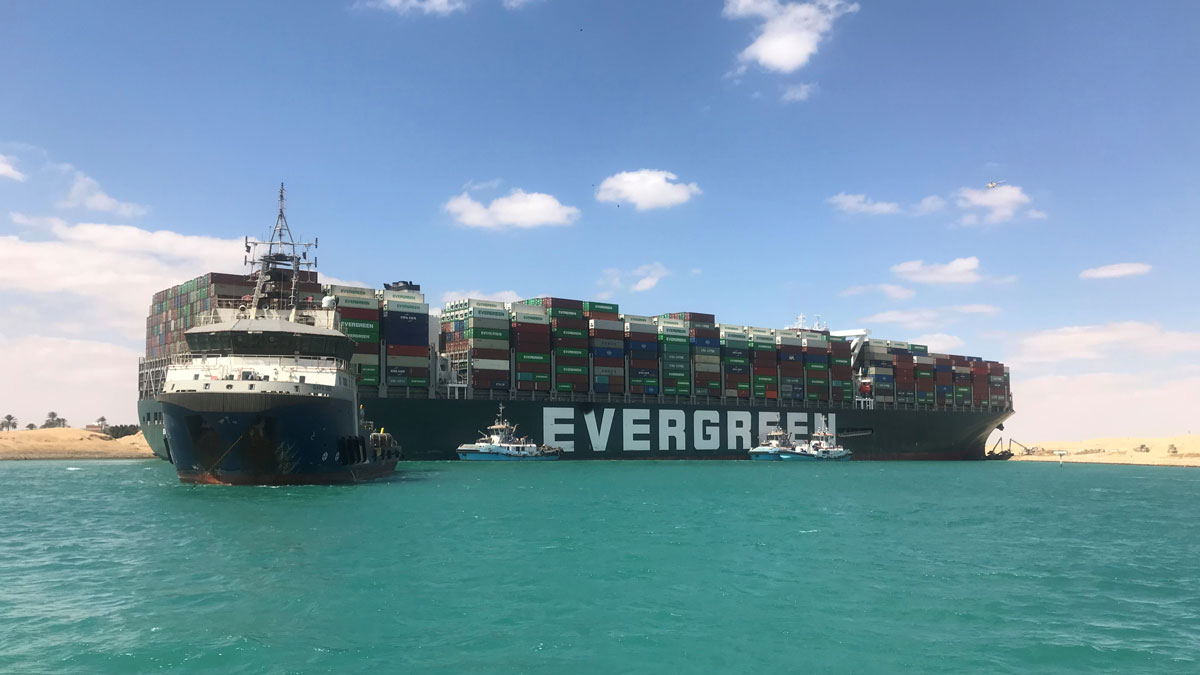Ever Given Partially Refloated in the Suez Canal by Expert Salvage Team of Boskalis Subsidiary SMIT Salvage
Boskalis announces the successful salvage operation of the grounded 20,000 TEU container vessel Ever Given in the Suez Canal. With a length of 400 meters and a width of nearly 60 meters this giant ship had been wedged in this vital shipping route since 23 March 2021 blocking all shipping traffic ever since.
“Shortly following the grounding of the Ever Given we were requested through SMIT Salvage to provide assistance with the salvage operation. I am excited to announce that our team of experts, working in close collaboration with the Suez Canal Authority, successfully refloated the Ever Given on 29 March at 15:05 hrs local time, thereby making free passage through the Suez Canal possible again. I am extremely proud of the outstanding job done by the team on site as well as the many SMIT Salvage and Boskalis colleagues back home to complete this challenging operation under the watchful eye of the world. The time pressure to complete this operation was evident and unprecedented and the result is a true display of our unique capabilities as a dredging and marine services provider,” Peter Berdowski, CEO Boskalis, stated.
For the refloating of the 224,000-ton container vessel approximately 30,000 cubic meters of sand was dredged to help free the vessel and a total of eleven harbour tugs and two powerful seagoing tugs (Alp Guard and Carlo Magna) were deployed. The vessel is towed to a location outside the channel for further inspection.
Backdrop
On 23 March, Ever Given was travelling through the Suez Canal, where it was then caught in a sandstorm. The strong winds, which reached 40 kn, resulted in the “loss of the ability to steer the ship,” causing the hull to deviate. The ship then ran aground at the 151 km (82 nmi) mark, and turned sideways, unable to free itself, blocking the canal on both sides. The crew consisting entirely of Indian nationals was accounted for and no injuries were reported. At the time of the incident, the ship was traveling from Tanjung Pelepas, Malaysia, to the Port of Rotterdam, Netherlands. It was fifth in a northbound convoy, with fifteen vessels behind it when it ran aground near the village of Manshiyet Rugola.
According to an analysis of data from ship tracking websites by Evert Lataire, head of maritime technology division at the University of Ghent, the bank effect, which may cause the stern of a ship to swing toward the near bank when operating in constricted waterway, may have contributed to the grounding, along with the lateral forces of westerly winds pushing sideways against the northbound ship. Since most of the focus of modern ship design is directed towards efficiency and stability at sea, the effects of hydrodynamics in shallow waters, especially considering the rapidly growing size of ships in the past decade, remain somewhat obscure and in need of further study.
Over 200 vessels at both ends of the canal were obstructed by Ever Given, including five other container ships of similar size. These included 41 bulk carriers and 24 crude tankers. The affected vessels represented roughly 16.9 million tonnes of deadweight. Some docked at ports and anchorages in the area, while many remained in place. Also affected by the obstruction were two Russian Navy vessels: Steregushchiy-class corvette Stoikiy and Altay-class oiler Kola. The two vessels, which were believed to have been the only military vessels affected by the blockage, were doing naval exercises in the area at the time. Kola had been involved in a minor collision with bulk carrier Ark Royal earlier that day; the two were anchored roughly 11 km (5.9 nmi) away from each other for the duration of the incident.



